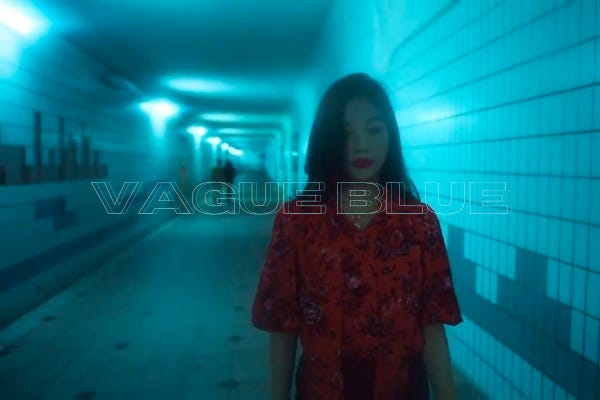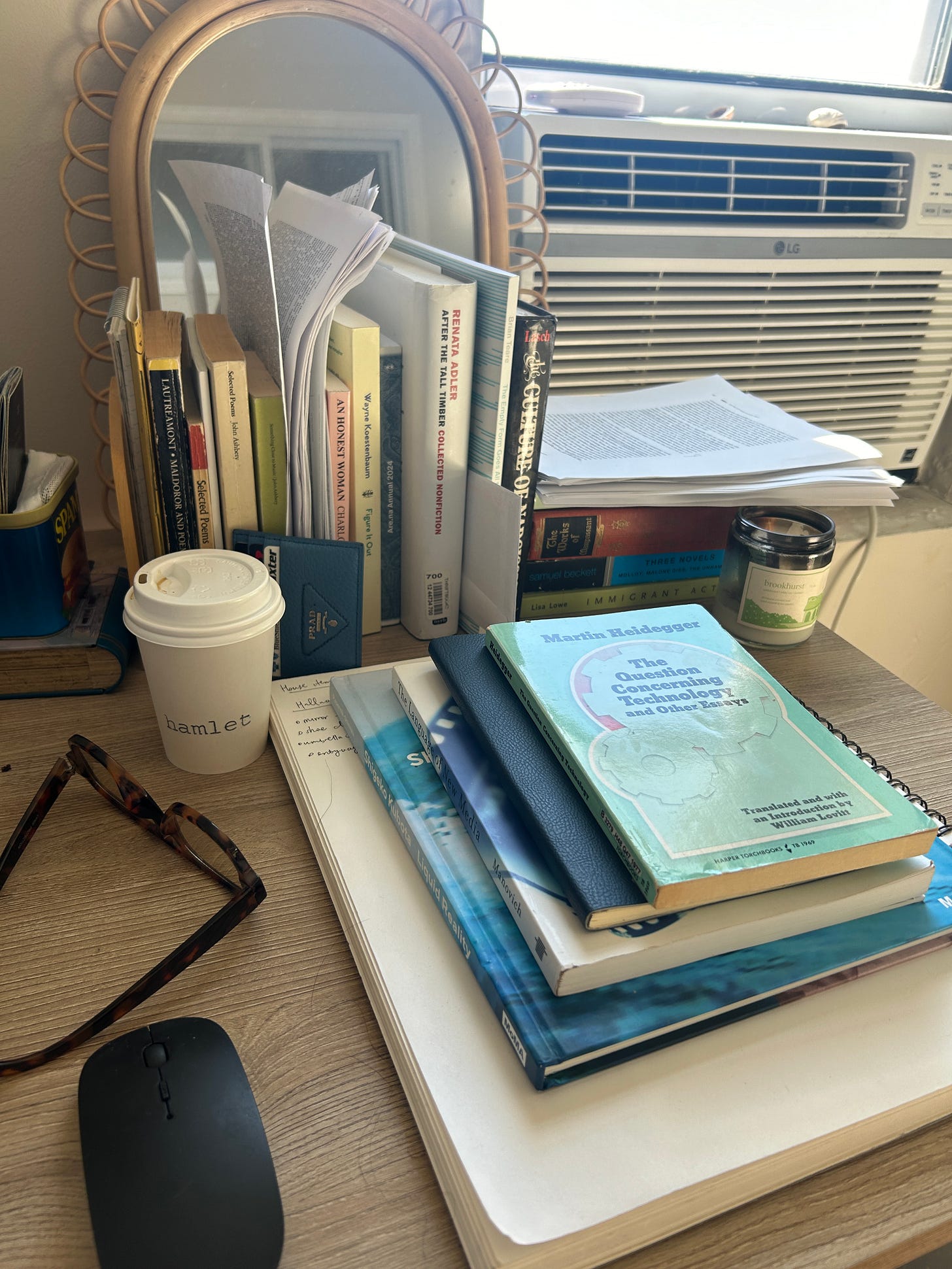Vague Blue
"Like the sky, and change all the time..."
The newsletter has a new name. Thank you to those who’ve offered your input in the Chat. I am trying to use Substack’s Chat function once a week to discuss things mentioned in the newsletter and generate new ideas. Also, nothing has changed but the name. Starting in February, there will be weekly capsule reviews and/or short personal dispatches for subscribers.
“My eyes are vague blue, like the sky, and change all the time…”
I’ve always loved that line in Frank O’Hara’s “Meditations in an Emergency,” one of the few poems I’ve committed to memory. I recite “Meditations” on days when I feel like I’m in a funk, and vague blue is the opening line to one of poem’s best stanzas, where the speaker bemoans his itinerant nature while (I imagine) lying in Central Park, watching the clouds pass by. He’s restless and ever-changing (“I am always looking away. Or again at something after it has given me up.”), incapable of staying at home and doing something (writing, perhaps?). But he feels a kind of duty in being attentive to the mundane, boring details of his life. He feels “needed by things as the sky must be about the earth.”
I can’t speak to the ongoing predicament of the speaker, but this poem has felt true to my life for the past year. I feel needed by things in New York — namely, to earn a living for myself — while I squander my days, dreaming of the freedom to be attentively bored. Blue is a special color, so it befits the occasion.
From my essay, “Writing Blue,” from the LA Review of Books Quarterly:
On the page, blue is a point of entry and relation for the reader, a navy fog drifting from the mountains to settle upon the sentences. With every new text, I am reintroduced to blue, greeted by this familiar acquaintance whose name and face reliably slip from memory … Blue becomes an inexact metaphor for love, loss, life, and the sublime.
Recently, I got mail from an old subscriber who asked me if I am no longer writing about the internet. I think it’s impossible for any writer to avoid the looming subject of “the internet” because so much of culture today involves the internet and is disseminated and/or produced by it. But looking back at the archives, I remember “On/Off,” published in September 2021, as a turning point for me. I had begun reading philosophers like Benjamin, Barthes, and Baudrillard and contemporary writers like Rob Horning and L.M. Sacasas, who’ve inspired me to approach technology and cultural criticism from a structural perspective, instead of deconstructing and following trends. Nevertheless, there is so much relevant reporting on the nuances of internet culture and the creator economy today that I’d be remiss if I didn’t mention reporters/writers/publications like:
Steffi Cao (formerly Buzzfeed and Forbes internet culture reporter), who recently launched her bimonthly internet dispatch
Rebecca Jennings, my former colleague at Vox
Rat House, a publication newly launched by tech journalist Morgan Sung ft. Alison Foreman, Rebecca Roland, and Sarah Vasile
Raquel Alvarado’s weekly Solitary Daughter (I credit Raquel for spearheading ArticleTok)
Katherine Dee’s weekly digest and podcast Default Wisdom, “an emotional scrapbook of the internet” (Katherine is Tapped In)
THE DIGEST
Essay: “I Am Your Conscious, I Am Love” (Harper’s Magazine)
I spent the past week in Hudson where I made progress on a piece of writing that I’ve struggled with for the past year. I always struggle with beginnings, so I turned to Hilton Als’s 2012 profile-personal-essay on Prince, which contains one of my favorite opening paragraphs: “Dick jokes, ass jokes, black-women-versus-white-women jokes, Taliban jokes, Whitney Houston jokes, more sex jokes, and then, finally, the best joke of all, because it plays like a confession telegraphed directly out of the comedian’s subconscious.” I love essays that utilize a specific subject or celebrity as a lens, approaching the subject as a multidimensional mirror to reveal something beyond the self. The subject, of course, is Prince, but Als fractures the essay into an enthralling meditation on queerness, desire, Black homosexuality, commodification of celebrity, and Dorothy Parker.
Movie: Spacked Out (2000)
Lawrence Lau’s coming-of-age film depicts childhood as a bad trip, a bubblegum pink prison that his four tween protagonists are desperately trying to break out of. After school, the girls shed their uniforms to cosplay adulthood (while still wearing glitter eyeshadow and plushie lanyards), even though they realize, through witnessing the bad behaviors of the adults in their lives, that maturity is a mask of competence and respectability. And so they smoke, they drink, they seek out drugs and sex and bodily highs. This delinquency, like their pixie cuts and pierced ears, begins as a shallow rebellion against schooled conformity and parental neglect. The script masterfully showcases how their misdeeds are the product of deep pain, pain that is briefly neutralized and forgotten in the presence of friends, pain that still harbors serious consequences. Like Justin Lin’s Better Luck Tomorrow, Spacked Out’s Y2K “aesthetics” and themes of juvenile delinquency remind some viewers of Euphoria and Harmony Korine’s filmography — superficial comparisons that warrant a closer analysis. But despite the characters’ stylish sass, I love how Spacked Out depicts girlhood with generous compassion, while acknowledging their fallibility and self-destructiveness. The movie ends with the girls together, not entirely all right, but together nonetheless.
Purchases: Royal blue hand-knit cardigan
I got this gorgeous cardigan from Proprietor’s Vintage in Hudson, which also has a storefront in Greenpoint. Lately, I’ve been preoccupied with purchasing “basics” — neutral sweaters and tees and pants that are well made and crafted from good fabrics (no polyester!). I’ve been layering this over a light long-sleeve or turtleneck, but am excited to debut it as a transition piece in spring as the weather warms up.
Thanks for reading! Last week’s issue “Up close & comfortable” is un-paywalled for the next 24 hours to give free subscribers a taste of what a paid subscription entails.






Shout-out to the Lautréamont on your desk! I remember one of my oldest friends saying "Everything begins with that book!" It's the craziest.
Finally had a chance to read this one. As usual, thoughtful and engaging. That Frank O’Hara poem is great. His line “If only I had grey, green, black, brown, yellow eyes; I would stay at home and do something” reminded me of a line from Rilke’s The Man Watching. There’s something in his very being he wants to break free from and just can’t. “If only we would let ourselves be dominated as things do by some immense storm, we would become strong too, and not need names.”